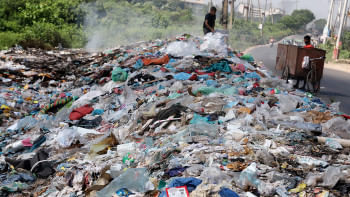Small-time plastic warriors are showing us the way

It is always refreshing to see small businesses and entrepreneurs finding ways to combat the biggest problems facing our society. According to a report by this daily, one such business initiative in Tangail has been producing single-use utensils from the sheaths of dried areca nut leaves. The inspiration for this endeavour came from Tamil Nadu. Just as in Bangladesh, single-use plastic and polythene items are banned in this Indian state, but unlike us, it has been able to convert to the alternative of leaf-based utensils.
In Bangladesh, the use of plastic products (especially of the disposable kind) seems only to be rising as consumerism intensifies. Even the High Court's 2020 directive to ban single-use plastic products in coastal areas as well as in hotels, motels, and restaurants across the country has fallen on deaf ears. Meanwhile, microplastics are infiltrating our bodies, burning of plastic waste is making our air toxic, and our rivers and canals are being choked by tons of polythene bags that are disposed there. Despite their devastating impacts, the authorities continue to be negligent in enforcing relevant directives to stop this culture, which is really worrisome.
In the aforementioned report, the young entrepreneur lamented that no one from the government or private sector has come forward to help expand his business. Isn't this exactly the kind of initiatives that we should be investing in to reduce the effects of pollution? Only a few days ago, the government allocated Tk 100 crore for the jute cellulose Sonali Bag project of scientist Mubarak Ahmed Khan. While this is admirable, the eco-friendly product would perhaps have already reached consumers if the project had been taken up by expert manufacturers, who could have helped the scientist turn it into a fully-fledged business.
Funding for small businesses producing eco-friendly products is crucial. Many of these endeavours also require the guidance of established private organisations so as to maximise their reach and impact. This will in turn encourage more businesses to see the overall benefits of producing environment-friendly products. So, we urge the government to take this matter seriously.


 For all latest news, follow The Daily Star's Google News channel.
For all latest news, follow The Daily Star's Google News channel. 










Comments